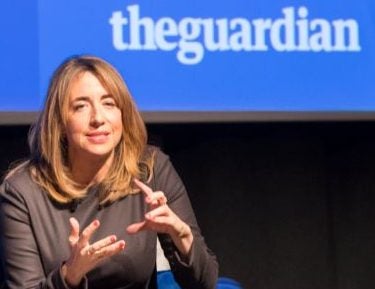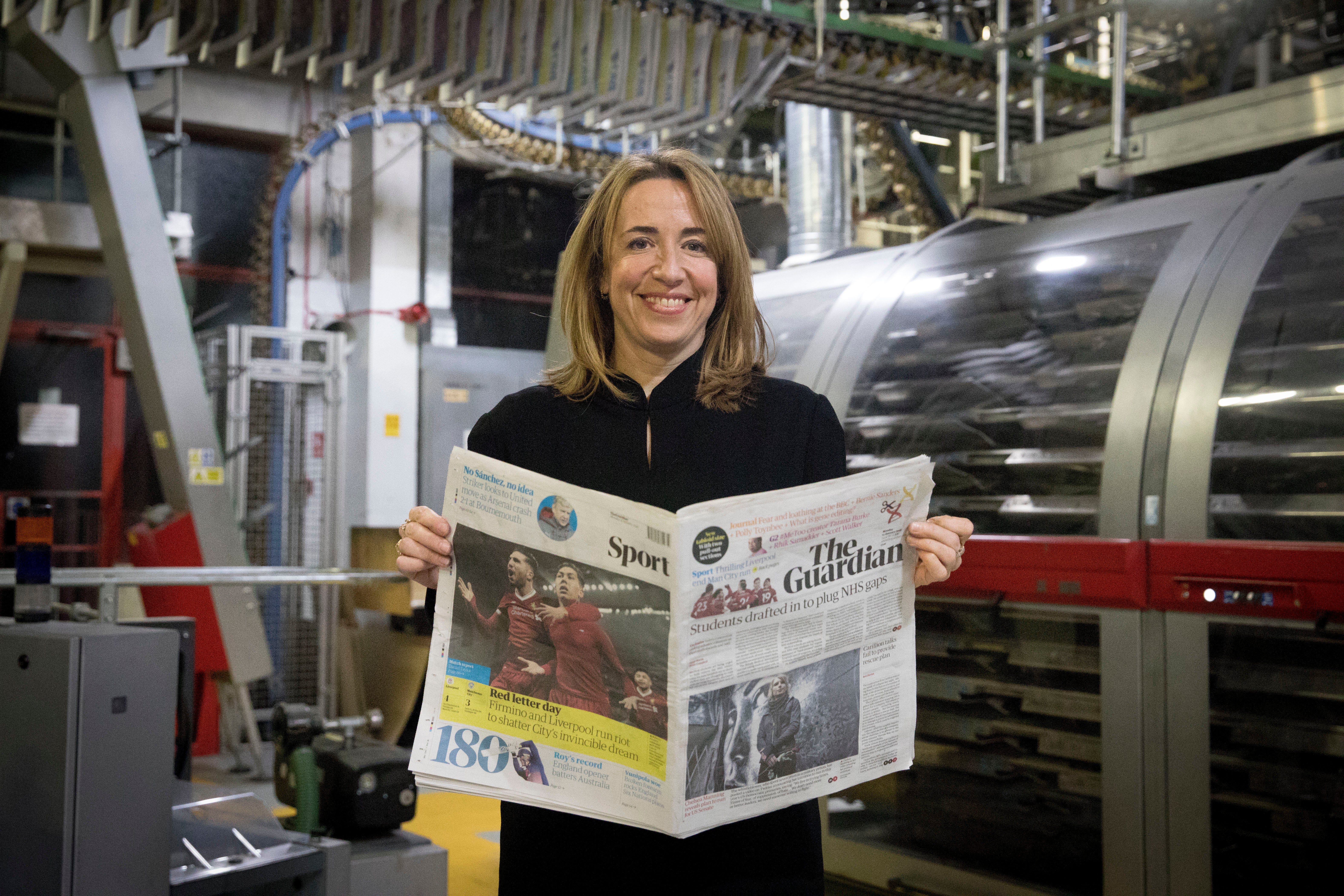
In an interview to mark 200 years of The Guardian, editor Katharine Viner spoke to Press Gazette about the secret of its longevity.
The Guardian enters its third century in a secure financial position (with just under £1bn in the bank and sustainable losses running at £10-20m annually). And while print circulation continues to decline (to just over 100,000 copies per day), it claims more than 1m paying readers and is the sixth biggest news website in the world with 317m website visits in March 2021.
PG: Congratulations on 200 years in print. What do you think is the secret to The Guardian’s success?
There are not many companies, in any business, that last for two centuries, and it says something about the role the Guardian plays in the world that it has got this far. I think it’s because we know who we are: we have roots, we have principles, we have philosophy, we have values.
As the Guardian enters its third century, nothing must change our mission, but the digital revolution might change how we interpret that mission for the modern age. We are now in a more levelled world, where journalists are no longer so separate from their audience.
To be successful today – to get the stories that really matter to readers, and to convey the information they need in ways they want – journalists must be part of the social fabric of the world they report on. The Guardian is a community of journalists and readers, all of us equal citizens of that community.
This special anniversary comes at an extraordinary time for our industry, and the world at large. What has been the lesson you’ve taken from the pandemic as editor of The Guardian?
Our coverage sought to foreground the science and the latest data, to hold the government and the scientific establishment to account and expose incompetence, and to bring empathy and humanity to the stories of the victims.
We realised early on that the pandemic had the capacity to change everything about how we live, so Guardian and Observer journalists devoted formidable effort and resources to investigating the social and economic effects of this crisis. We also understood the important role that endeavour, community and charity would play in confronting the emergency, and so sought out hope wherever it could be found.
We are still guided by the principles that shaped our first 200 years, with two crucial additions: we must always be a part of the community we represent, and we must remember that that community is now a global one, confronting crises on a global scale.

Guardian editor Katharine Viner holds the first edition of the Guardian at it’s new printing site, Trinity Mirror Printing in Watford. 14 January 2018
How will the pandemic change the working culture at The Guardian? What might this look like once restrictions are finally lifted?
We have set up a programme which is focused specifically on the future of work and what that means for the Guardian. The programme includes representatives from across the business and provides an important opportunity to look at what we’ve learned over the past twelve months of remote working and define an ambitious model for how we will work in the future.
As the news industry struggles to find a sustainable business model for journalism in the digital age, what will keep the Guardian publishing for another 200 years?
Moments of crisis tend to raise the question of what the role of journalism should be. The need for reliable information is a reminder of why journalism is necessary – but also a reminder that simply recording what has happened is not enough. In fact, this is what has always distinguished the Guardian throughout its history: its purpose. The facts, but not only the facts.
How do you balance keeping The Guardian true to its brand identity, and the expectations of loyal readers, but also innovate to stand out and win new readers?
Our duty to serve the public interest has not changed, but our “public” is no longer the liberals of Manchester, or even the people of the UK – it is now local and national and international, British and European, American and Australian, and everywhere else that our readers and supporters live. Since 2016, alongside our subscriptions, the Guardian has been generously supported by contributions from readers, who pay voluntarily so that our journalism can be a public good, free to all.
What defines this community is not geography, or even reading or supporting the Guardian; it is a community of those who share our hope for the future, who know that the way things are now is not the way they have to be, and who want to see this pandemic “turned to beneficial account”, to make a different world from the suffering and solidarity that we have all experienced in this difficult year.
What’s been the paper’s biggest achievement/story of the last two centuries?
It’s impossible to pick just one [story]. The biggest Guardian stories of the past few decades – the Edward Snowden revelations, the phone-hacking scandal, the Panama and Paradise papers, the Windrush scandal – were fiercely disputed and fought by powerful interests, bringing unfriendly contacts from the police, government ministers, and intelligence agencies. Even last year’s scoop revealing Dominic Cummings had broken lockdown – which “gripped the public in a way we’ve never seen before”, as one pollster later wrote – was subject to vociferous pushback from minister after minister.
Our readers fund the Guardian to a greater degree than ever before, and as journalists we experience the world with our readers as equal citizens. Our relationship with them is not transactional – it is about sharing a sense of purpose and a commitment to understand and illuminate our times.
We now receive support from readers in more than 180 countries, helping us to safeguard the Guardian’s independent journalism. And we do it in an open model, that means some readers pay so that quality journalism is available to all who might want to read it. That approach was widely mocked when we launched it five years ago – but it’s been very successful, and we see many imitations in others’ models around the world now.
The Guardian saw its biggest year for digital reader revenues in 2020, gaining 268,000 new digital subscriptions and recurring contributions, an increase of 43%.
We also received more than 530,000 single contributions from readers who believe in the Guardian’s values and purpose.
Including print subscribers and single contributions, people supported the Guardian financially more than 1.5m times last year.
Will The Guardian remain in print? How long for?
Many of our most loyal readers are in print, but obviously we devote the overwhelming majority of our time, energy and resources to digital. A brilliant digital offering can absolutely be compatible with a brilliant print edition, but they are very different audiences: you need to prioritise digital while maintaining the excellence of print.
Although newsstand sales fell last year, our print subscriptions actually rose slightly – so there is plenty of life remaining in print for some time.
Below we look at some key dates along The Guardian’s 200-year timeline.
Timeline of key dates:
5 May 1821 – First issue of Manchester Guardian is published by John Edward Taylor, a witness to the Peterloo Massacre two years earlier. The title comes out weekly, on Saturdays, and costs just seven pence.
1855 – The paper begins publishing daily after stamp duty on newspapers is abolished. The daily paper costs just two pence to buy.
1872 – CP Scott is appointed editor of the Manchester Guardian.
1907 – CP Scott buys the paper, becoming both owner and editor.
May 1921 – The Manchester Guardian turns 100 and Scott writes in his leader column that “comment is free, but facts are sacred”.
1932 – William Percival Crozier is appointed editor. It follows Scott’s retirement and death and the death of his son, Ted, who had replaced his father as editor of the paper, soon after.
1936 – Scott’s Trust created as title’s new owner.
1944 – Alfred Powell Wadsworth becomes editor.
1952 – Ads are replaced with news on the front page.
1956 – Alastair Hetherington is appointed editor.
1959 – The paper drops Manchester from its name, becoming The Guardian.
1975 – Peter Preston is named editor.
1976 – The Guardian relocates to London.
1992 – G2 section is launched.
1993 – The Guardian buys The Observer from Lonrho. It later changes its name to the Guardian Media Group.
1995 – Alan Rusbridger is named editor of The Guardian.
January 1999 – Guardian Unlimited, a network of websites including News Unlimited, is launched.
February 2001 – The Guardian’s website guardianunlimited.co.uk becomes guardian.co.uk.
2005 – The Guardian changes its print size from broadsheet to Berliner.
2006 – Online comments section launched. Publisher Guardian Newspapers is renamed Guardian News & Media.
2008 – Guardian News & Media moves to Kings Place, London.
2009 – First iteration of The Guardian iPhone app launches.
2010 – The Guardian publishes the War Logs, revealing details of the Iraq and Afghanistan conflicts through secret military files, and reports on further sensitive US diplomatic cables leaked by Wikileaks.
2011 – The Guardian breaks the story that the News of the World hacked missing schoolgirl Milly Dowler’s phone (the paper later closes and the story leads to the Leveson Inquiry into the culture and ethics of the press).
2013 – Guardian Australia launches. The Guardian publishes the NSA Files, leaked by whistleblower Edward Snowden, which exposed mass surveillance by the US and UK intelligence agencies.
2014 – Guardian Media Group receives £619m from its sale of a 50.1% stake in Trader Media Group, effectively safeguarding its financial future. Involvement in the business dates back to 1982 when it bought Northwest Automart and then merged it with Autotrader.
2015 – Katharine Viner is appointed editor-in-chief of The Guardian.
2016 – The Guardian publishes the Panama Papers investigation into leaked documents from law firm Mossack Fonseca, exposing how some of the super rich hide their money off shore.
2017 – The Guardian is first to report on what becomes known as the Windrush Scandal in the UK, which saw the government threaten Commonwealth citizens with deportation. It also publishes the Paradise Papers, based on leaked files from an off-shore law firm.
2017 – Guardian sells its final stake in Ascential, formerly Emap, for £239m. Gives The Guardian a total endowment fund to cover future losses of £1,039m.
January 2018 – The Guardian changes to a tabloid format in print.
2019 – GMG announces it has broken even after a three-year strategy to turn its finances around.
5 May 2021 – The Guardian marks its 200th birthday.
Email pged@pressgazette.co.uk to point out mistakes, provide story tips or send in a letter for publication on our "Letters Page" blog
